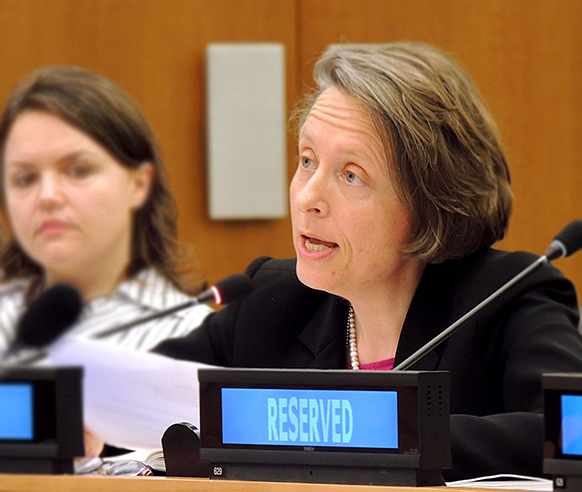Sister Áine O’Connor: A positive influence for global action at the U.N.
share
By Karel B. Lucander

“Over the last few years, my sense of lucidness and connectedness to the land is something that has influenced my perspective and my experience of the sacred. When I land back in Ireland, I know I’m home, whether it’s the smells or the ground underneath me,” says Sister Áine O’Connor.
Spending the first two decades of her life in Dublin has shaped the lens through which she views the world. Yet that lens has greatly widened since 1994 when she came to the United States. It now encompasses the vast universe in which Sister Áine exists—a world that she can positively influence as Mercy Global Action coordinator at the United Nations in New York City. So whether one hails from the rolling, green hills of the Emerald Isle as she does or the more poverty stricken landscapes of Peru, we’re all in it together according to this Sister of Mercy.
“The concerns we are facing are global—poverty, lack of food and water, environmental abuses—they’re of huge proportions, they span the globe, and they are interconnected,” says Sister Áine. “We are all interconnected. The world needs serious alliances to address the systemic, human-made, global injustices of our day. What might have been considered an issue in a developing country before is now showing up everywhere.”
Appointed Mercy Global Action coordinator in February 2012, Sister Áine meets at the U.N. with other non-governmental agencies that share the same global concerns, such as mining abuse, unsustainable development and human trafficking. Using their special consultative status with the Economic and Social Council, they collectively plan how to interact most effectively with governmental processes and use their voices to bring about structural change and intervention. These tools can include both written and oral processes to weigh in and make a difference based on their grassroots experience and critique.
“Our work is like detective work; we try to investigate where to make our opinions known and how to best influence,” she says. “There are Sisters of Mercy and people on the ground, feeding the information to Mercy Global Action teams, of which I am a part, much of it through Skype. My real energy and focus is keeping the pulse on what is happening at the U.N. and how we can interact with this important global body.”
She also sees her ministry as challenging power structures, based upon what people and Earth are experiencing.
“I need to know about the social, economic, political, and cultural systems that make people poor and destroy Earth. In this ministry, we can never do enough, and there is a tension of not having enough time and resources to address our Mercy global justice priorities. With the Sisters of Mercy worldwide, I have a great sense of being compelled to act with and on behalf of peoples and Earth, who have been rendered poor and whose dignity is being violated—we are both keepers and distributors of the stories and the scandal of injustice imposed globally on people and the critical condition of our planet,” says Sister Áine.
A Sister of Mercy since 1995, Sister Áine also shares what it is like to be a part of this religious community of women today.
“Interestingly enough, there are strong similarities between the world today and the world when Catherine McAuley founded the Sisters of Mercy in 1831. They include human-made abject poverty and to know that God wants a fullness of life for the world. The gospel witness that we bring with our communal lives of prayer and reflection and our vision for the people and the Earth is probably much the same,” she says.